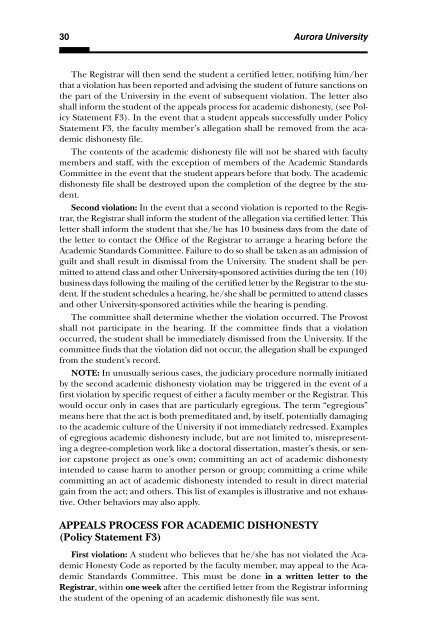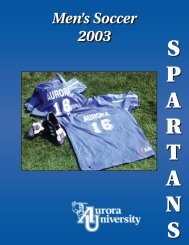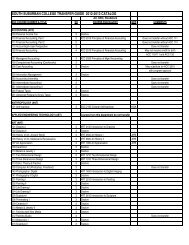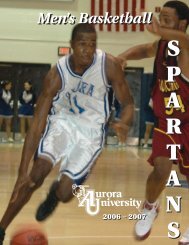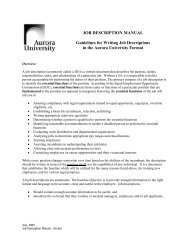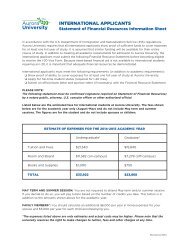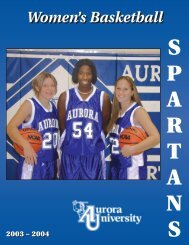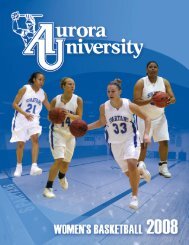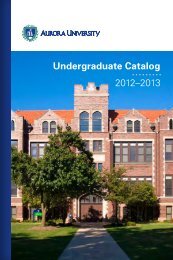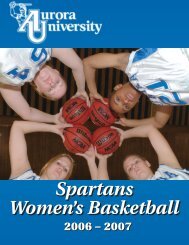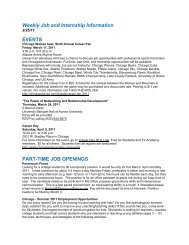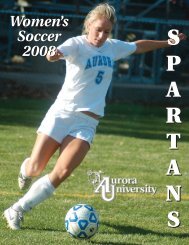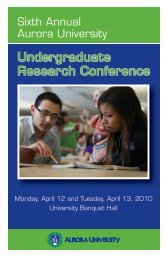Grad Catalog 09-11.indd - Aurora University
Grad Catalog 09-11.indd - Aurora University
Grad Catalog 09-11.indd - Aurora University
Create successful ePaper yourself
Turn your PDF publications into a flip-book with our unique Google optimized e-Paper software.
30 <strong>Aurora</strong> <strong>University</strong><br />
The Registrar will then send the student a certified letter, notifying him/her<br />
that a violation has been reported and advising the student of future sanctions on<br />
the part of the <strong>University</strong> in the event of subsequent violation. The letter also<br />
shall inform the student of the appeals process for academic dishonesty, (see Policy<br />
Statement F3). In the event that a student appeals successfully under Policy<br />
Statement F3, the faculty member’s allegation shall be removed from the academic<br />
dishonesty file.<br />
The contents of the academic dishonesty file will not be shared with faculty<br />
members and staff, with the exception of members of the Academic Standards<br />
Committee in the event that the student appears before that body. The academic<br />
dishonesty file shall be destroyed upon the completion of the degree by the student.<br />
Second violation: In the event that a second violation is reported to the Registrar,<br />
the Registrar shall inform the student of the allegation via certified letter. This<br />
letter shall inform the student that she/he has 10 business days from the date of<br />
the letter to contact the Office of the Registrar to arrange a hearing before the<br />
Academic Standards Committee. Failure to do so shall be taken as an admission of<br />
guilt and shall result in dismissal from the <strong>University</strong>. The student shall be permitted<br />
to attend class and other <strong>University</strong>-sponsored activities during the ten (10)<br />
business days following the mailing of the certified letter by the Registrar to the student.<br />
If the student schedules a hearing, he/she shall be permitted to attend classes<br />
and other <strong>University</strong>-sponsored activities while the hearing is pending.<br />
The committee shall determine whether the violation occurred. The Provost<br />
shall not participate in the hearing. If the committee finds that a violation<br />
occurred, the student shall be immediately dismissed from the <strong>University</strong>. If the<br />
committee finds that the violation did not occur, the allegation shall be expunged<br />
from the student’s record.<br />
NOTE: In unusually serious cases, the judiciary procedure normally initiated<br />
by the second academic dishonesty violation may be triggered in the event of a<br />
first violation by specific request of either a faculty member or the Registrar. This<br />
would occur only in cases that are particularly egregious. The term “egregious”<br />
means here that the act is both premeditated and, by itself, potentially damaging<br />
to the academic culture of the <strong>University</strong> if not immediately redressed. Examples<br />
of egregious academic dishonesty include, but are not limited to, misrepresenting<br />
a degree-completion work like a doctoral dissertation, master’s thesis, or senior<br />
capstone project as one’s own; committing an act of academic dishonesty<br />
intended to cause harm to another person or group; committing a crime while<br />
committing an act of academic dishonesty intended to result in direct material<br />
gain from the act; and others. This list of examples is illustrative and not exhaustive.<br />
Other behaviors may also apply.<br />
APPEALS PROCESS FOR ACADEMIC DISHONESTY<br />
(Policy Statement F3)<br />
First violation: A student who believes that he/she has not violated the Academic<br />
Honesty Code as reported by the faculty member, may appeal to the Academic<br />
Standards Committee. This must be done in a written letter to the<br />
Registrar, within one week after the certified letter from the Registrar informing<br />
the student of the opening of an academic dishonestly file was sent.


